Company Law in Australia: Duties of Directors and Company Types
VerifiedAdded on 2023/03/17
|8
|2457
|51
Report
AI Summary
This report examines key aspects of Australian company law, beginning with the doctrine of the separate legal entity established in Salomon v A Salomon And Co Ltd [1897]. It then explores the different types of companies in Australia, including companies limited by shares, companies limited by guarantee, proprietary companies, and public companies, including the obligations of ASX-listed companies. The report also details the various directorial duties under the Corporations Act 2001, such as the duty of good faith and proper purpose, the duty to avoid conflicts of interest, the duty of care, skill, and diligence, and the duty to prevent insolvent trading. The report references relevant case law and statutory provisions, providing a comprehensive overview of the legal responsibilities of company directors in Australia.
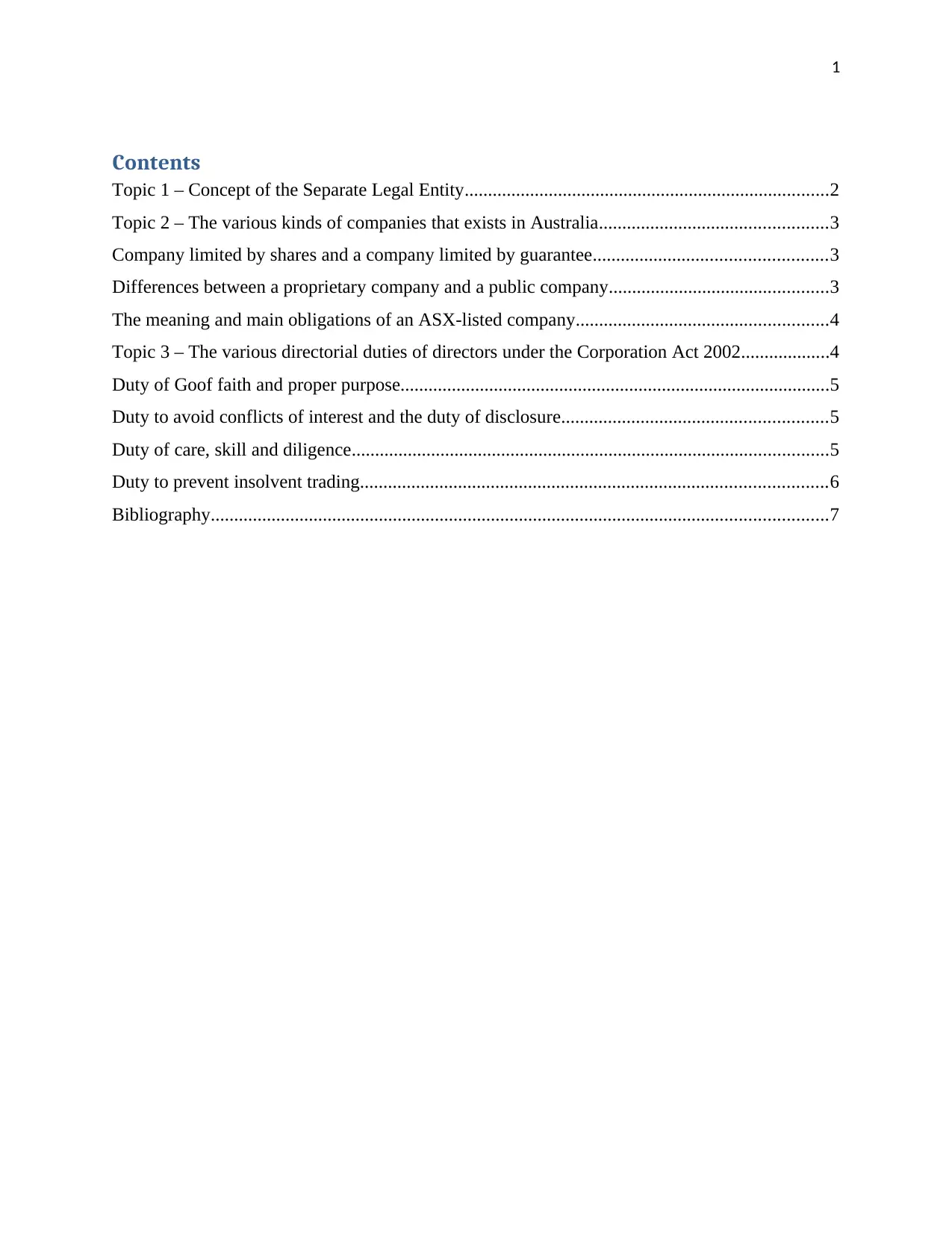
1
Contents
Topic 1 – Concept of the Separate Legal Entity..............................................................................2
Topic 2 – The various kinds of companies that exists in Australia.................................................3
Company limited by shares and a company limited by guarantee..................................................3
Differences between a proprietary company and a public company...............................................3
The meaning and main obligations of an ASX-listed company......................................................4
Topic 3 – The various directorial duties of directors under the Corporation Act 2002...................4
Duty of Goof faith and proper purpose............................................................................................5
Duty to avoid conflicts of interest and the duty of disclosure.........................................................5
Duty of care, skill and diligence......................................................................................................5
Duty to prevent insolvent trading....................................................................................................6
Bibliography....................................................................................................................................7
Contents
Topic 1 – Concept of the Separate Legal Entity..............................................................................2
Topic 2 – The various kinds of companies that exists in Australia.................................................3
Company limited by shares and a company limited by guarantee..................................................3
Differences between a proprietary company and a public company...............................................3
The meaning and main obligations of an ASX-listed company......................................................4
Topic 3 – The various directorial duties of directors under the Corporation Act 2002...................4
Duty of Goof faith and proper purpose............................................................................................5
Duty to avoid conflicts of interest and the duty of disclosure.........................................................5
Duty of care, skill and diligence......................................................................................................5
Duty to prevent insolvent trading....................................................................................................6
Bibliography....................................................................................................................................7
Paraphrase This Document
Need a fresh take? Get an instant paraphrase of this document with our AI Paraphraser
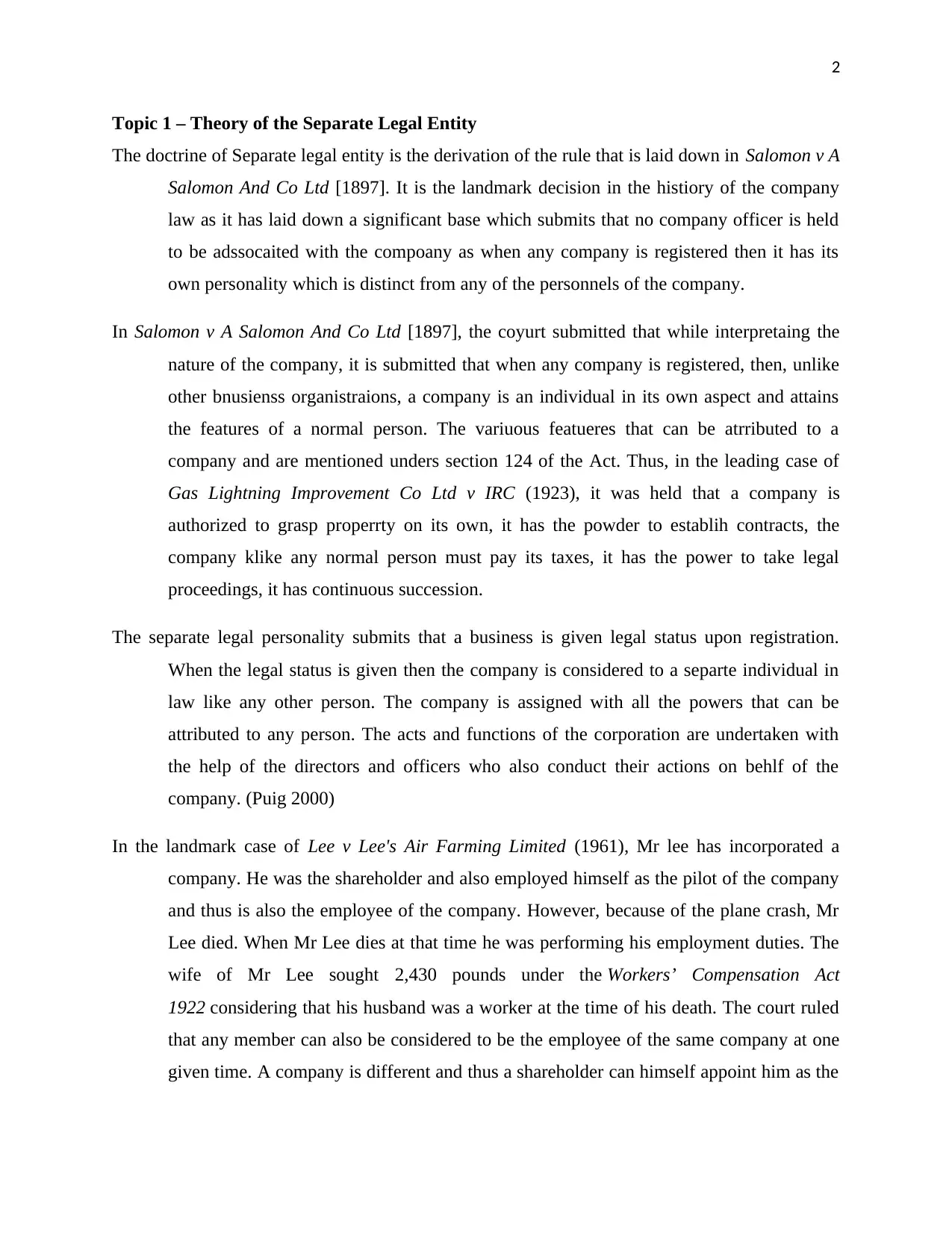
2
Topic 1 – Theory of the Separate Legal Entity
The doctrine of Separate legal entity is the derivation of the rule that is laid down in Salomon v A
Salomon And Co Ltd [1897]. It is the landmark decision in the histiory of the company
law as it has laid down a significant base which submits that no company officer is held
to be adssocaited with the compoany as when any company is registered then it has its
own personality which is distinct from any of the personnels of the company.
In Salomon v A Salomon And Co Ltd [1897], the coyurt submitted that while interpretaing the
nature of the company, it is submitted that when any company is registered, then, unlike
other bnusienss organistraions, a company is an individual in its own aspect and attains
the features of a normal person. The variuous featueres that can be atrributed to a
company and are mentioned unders section 124 of the Act. Thus, in the leading case of
Gas Lightning Improvement Co Ltd v IRC (1923), it was held that a company is
authorized to grasp properrty on its own, it has the powder to establih contracts, the
company klike any normal person must pay its taxes, it has the power to take legal
proceedings, it has continuous succession.
The separate legal personality submits that a business is given legal status upon registration.
When the legal status is given then the company is considered to a separte individual in
law like any other person. The company is assigned with all the powers that can be
attributed to any person. The acts and functions of the corporation are undertaken with
the help of the directors and officers who also conduct their actions on behlf of the
company. (Puig 2000)
In the landmark case of Lee v Lee's Air Farming Limited (1961), Mr lee has incorporated a
company. He was the shareholder and also employed himself as the pilot of the company
and thus is also the employee of the company. However, because of the plane crash, Mr
Lee died. When Mr Lee dies at that time he was performing his employment duties. The
wife of Mr Lee sought 2,430 pounds under the Workers’ Compensation Act
1922 considering that his husband was a worker at the time of his death. The court ruled
that any member can also be considered to be the employee of the same company at one
given time. A company is different and thus a shareholder can himself appoint him as the
Topic 1 – Theory of the Separate Legal Entity
The doctrine of Separate legal entity is the derivation of the rule that is laid down in Salomon v A
Salomon And Co Ltd [1897]. It is the landmark decision in the histiory of the company
law as it has laid down a significant base which submits that no company officer is held
to be adssocaited with the compoany as when any company is registered then it has its
own personality which is distinct from any of the personnels of the company.
In Salomon v A Salomon And Co Ltd [1897], the coyurt submitted that while interpretaing the
nature of the company, it is submitted that when any company is registered, then, unlike
other bnusienss organistraions, a company is an individual in its own aspect and attains
the features of a normal person. The variuous featueres that can be atrributed to a
company and are mentioned unders section 124 of the Act. Thus, in the leading case of
Gas Lightning Improvement Co Ltd v IRC (1923), it was held that a company is
authorized to grasp properrty on its own, it has the powder to establih contracts, the
company klike any normal person must pay its taxes, it has the power to take legal
proceedings, it has continuous succession.
The separate legal personality submits that a business is given legal status upon registration.
When the legal status is given then the company is considered to a separte individual in
law like any other person. The company is assigned with all the powers that can be
attributed to any person. The acts and functions of the corporation are undertaken with
the help of the directors and officers who also conduct their actions on behlf of the
company. (Puig 2000)
In the landmark case of Lee v Lee's Air Farming Limited (1961), Mr lee has incorporated a
company. He was the shareholder and also employed himself as the pilot of the company
and thus is also the employee of the company. However, because of the plane crash, Mr
Lee died. When Mr Lee dies at that time he was performing his employment duties. The
wife of Mr Lee sought 2,430 pounds under the Workers’ Compensation Act
1922 considering that his husband was a worker at the time of his death. The court ruled
that any member can also be considered to be the employee of the same company at one
given time. A company is different and thus a shareholder can himself appoint him as the
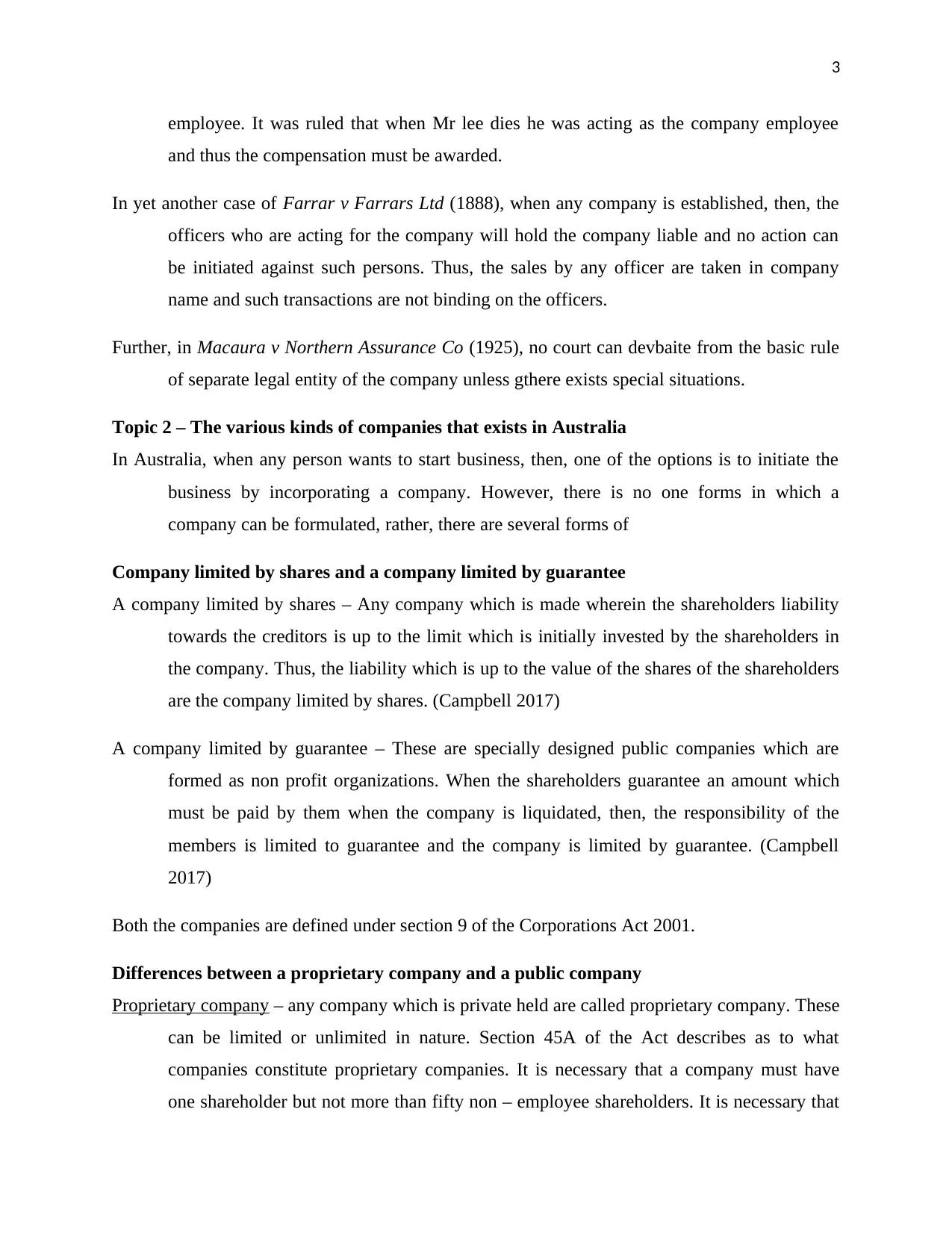
3
employee. It was ruled that when Mr lee dies he was acting as the company employee
and thus the compensation must be awarded.
In yet another case of Farrar v Farrars Ltd (1888), when any company is established, then, the
officers who are acting for the company will hold the company liable and no action can
be initiated against such persons. Thus, the sales by any officer are taken in company
name and such transactions are not binding on the officers.
Further, in Macaura v Northern Assurance Co (1925), no court can devbaite from the basic rule
of separate legal entity of the company unless gthere exists special situations.
Topic 2 – The various kinds of companies that exists in Australia
In Australia, when any person wants to start business, then, one of the options is to initiate the
business by incorporating a company. However, there is no one forms in which a
company can be formulated, rather, there are several forms of
Company limited by shares and a company limited by guarantee
A company limited by shares – Any company which is made wherein the shareholders liability
towards the creditors is up to the limit which is initially invested by the shareholders in
the company. Thus, the liability which is up to the value of the shares of the shareholders
are the company limited by shares. (Campbell 2017)
A company limited by guarantee – These are specially designed public companies which are
formed as non profit organizations. When the shareholders guarantee an amount which
must be paid by them when the company is liquidated, then, the responsibility of the
members is limited to guarantee and the company is limited by guarantee. (Campbell
2017)
Both the companies are defined under section 9 of the Corporations Act 2001.
Differences between a proprietary company and a public company
Proprietary company – any company which is private held are called proprietary company. These
can be limited or unlimited in nature. Section 45A of the Act describes as to what
companies constitute proprietary companies. It is necessary that a company must have
one shareholder but not more than fifty non – employee shareholders. It is necessary that
employee. It was ruled that when Mr lee dies he was acting as the company employee
and thus the compensation must be awarded.
In yet another case of Farrar v Farrars Ltd (1888), when any company is established, then, the
officers who are acting for the company will hold the company liable and no action can
be initiated against such persons. Thus, the sales by any officer are taken in company
name and such transactions are not binding on the officers.
Further, in Macaura v Northern Assurance Co (1925), no court can devbaite from the basic rule
of separate legal entity of the company unless gthere exists special situations.
Topic 2 – The various kinds of companies that exists in Australia
In Australia, when any person wants to start business, then, one of the options is to initiate the
business by incorporating a company. However, there is no one forms in which a
company can be formulated, rather, there are several forms of
Company limited by shares and a company limited by guarantee
A company limited by shares – Any company which is made wherein the shareholders liability
towards the creditors is up to the limit which is initially invested by the shareholders in
the company. Thus, the liability which is up to the value of the shares of the shareholders
are the company limited by shares. (Campbell 2017)
A company limited by guarantee – These are specially designed public companies which are
formed as non profit organizations. When the shareholders guarantee an amount which
must be paid by them when the company is liquidated, then, the responsibility of the
members is limited to guarantee and the company is limited by guarantee. (Campbell
2017)
Both the companies are defined under section 9 of the Corporations Act 2001.
Differences between a proprietary company and a public company
Proprietary company – any company which is private held are called proprietary company. These
can be limited or unlimited in nature. Section 45A of the Act describes as to what
companies constitute proprietary companies. It is necessary that a company must have
one shareholder but not more than fifty non – employee shareholders. It is necessary that
⊘ This is a preview!⊘
Do you want full access?
Subscribe today to unlock all pages.

Trusted by 1+ million students worldwide
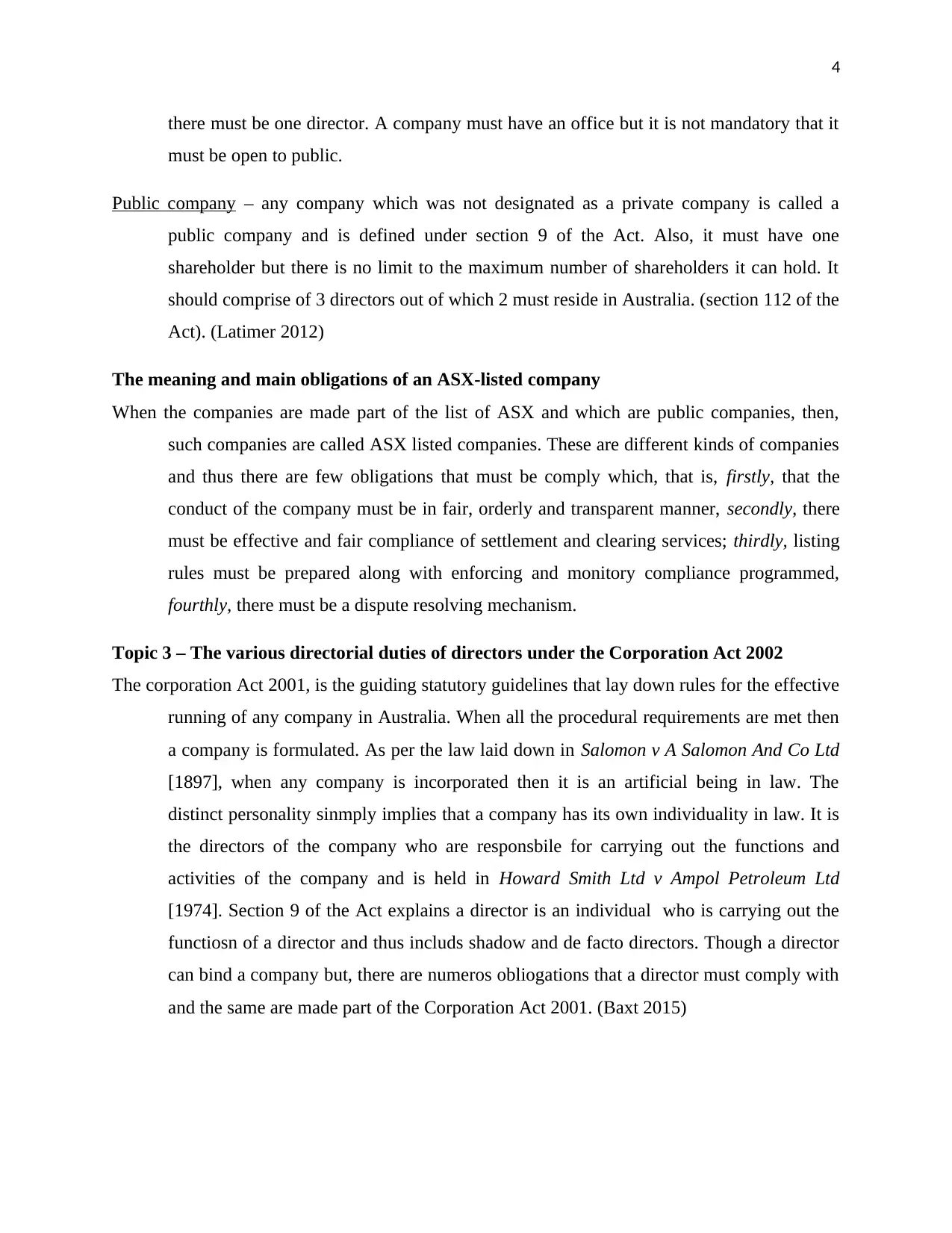
4
there must be one director. A company must have an office but it is not mandatory that it
must be open to public.
Public company – any company which was not designated as a private company is called a
public company and is defined under section 9 of the Act. Also, it must have one
shareholder but there is no limit to the maximum number of shareholders it can hold. It
should comprise of 3 directors out of which 2 must reside in Australia. (section 112 of the
Act). (Latimer 2012)
The meaning and main obligations of an ASX-listed company
When the companies are made part of the list of ASX and which are public companies, then,
such companies are called ASX listed companies. These are different kinds of companies
and thus there are few obligations that must be comply which, that is, firstly, that the
conduct of the company must be in fair, orderly and transparent manner, secondly, there
must be effective and fair compliance of settlement and clearing services; thirdly, listing
rules must be prepared along with enforcing and monitory compliance programmed,
fourthly, there must be a dispute resolving mechanism.
Topic 3 – The various directorial duties of directors under the Corporation Act 2002
The corporation Act 2001, is the guiding statutory guidelines that lay down rules for the effective
running of any company in Australia. When all the procedural requirements are met then
a company is formulated. As per the law laid down in Salomon v A Salomon And Co Ltd
[1897], when any company is incorporated then it is an artificial being in law. The
distinct personality sinmply implies that a company has its own individuality in law. It is
the directors of the company who are responsbile for carrying out the functions and
activities of the company and is held in Howard Smith Ltd v Ampol Petroleum Ltd
[1974]. Section 9 of the Act explains a director is an individual who is carrying out the
functiosn of a director and thus includs shadow and de facto directors. Though a director
can bind a company but, there are numeros obliogations that a director must comply with
and the same are made part of the Corporation Act 2001. (Baxt 2015)
there must be one director. A company must have an office but it is not mandatory that it
must be open to public.
Public company – any company which was not designated as a private company is called a
public company and is defined under section 9 of the Act. Also, it must have one
shareholder but there is no limit to the maximum number of shareholders it can hold. It
should comprise of 3 directors out of which 2 must reside in Australia. (section 112 of the
Act). (Latimer 2012)
The meaning and main obligations of an ASX-listed company
When the companies are made part of the list of ASX and which are public companies, then,
such companies are called ASX listed companies. These are different kinds of companies
and thus there are few obligations that must be comply which, that is, firstly, that the
conduct of the company must be in fair, orderly and transparent manner, secondly, there
must be effective and fair compliance of settlement and clearing services; thirdly, listing
rules must be prepared along with enforcing and monitory compliance programmed,
fourthly, there must be a dispute resolving mechanism.
Topic 3 – The various directorial duties of directors under the Corporation Act 2002
The corporation Act 2001, is the guiding statutory guidelines that lay down rules for the effective
running of any company in Australia. When all the procedural requirements are met then
a company is formulated. As per the law laid down in Salomon v A Salomon And Co Ltd
[1897], when any company is incorporated then it is an artificial being in law. The
distinct personality sinmply implies that a company has its own individuality in law. It is
the directors of the company who are responsbile for carrying out the functions and
activities of the company and is held in Howard Smith Ltd v Ampol Petroleum Ltd
[1974]. Section 9 of the Act explains a director is an individual who is carrying out the
functiosn of a director and thus includs shadow and de facto directors. Though a director
can bind a company but, there are numeros obliogations that a director must comply with
and the same are made part of the Corporation Act 2001. (Baxt 2015)
Paraphrase This Document
Need a fresh take? Get an instant paraphrase of this document with our AI Paraphraser
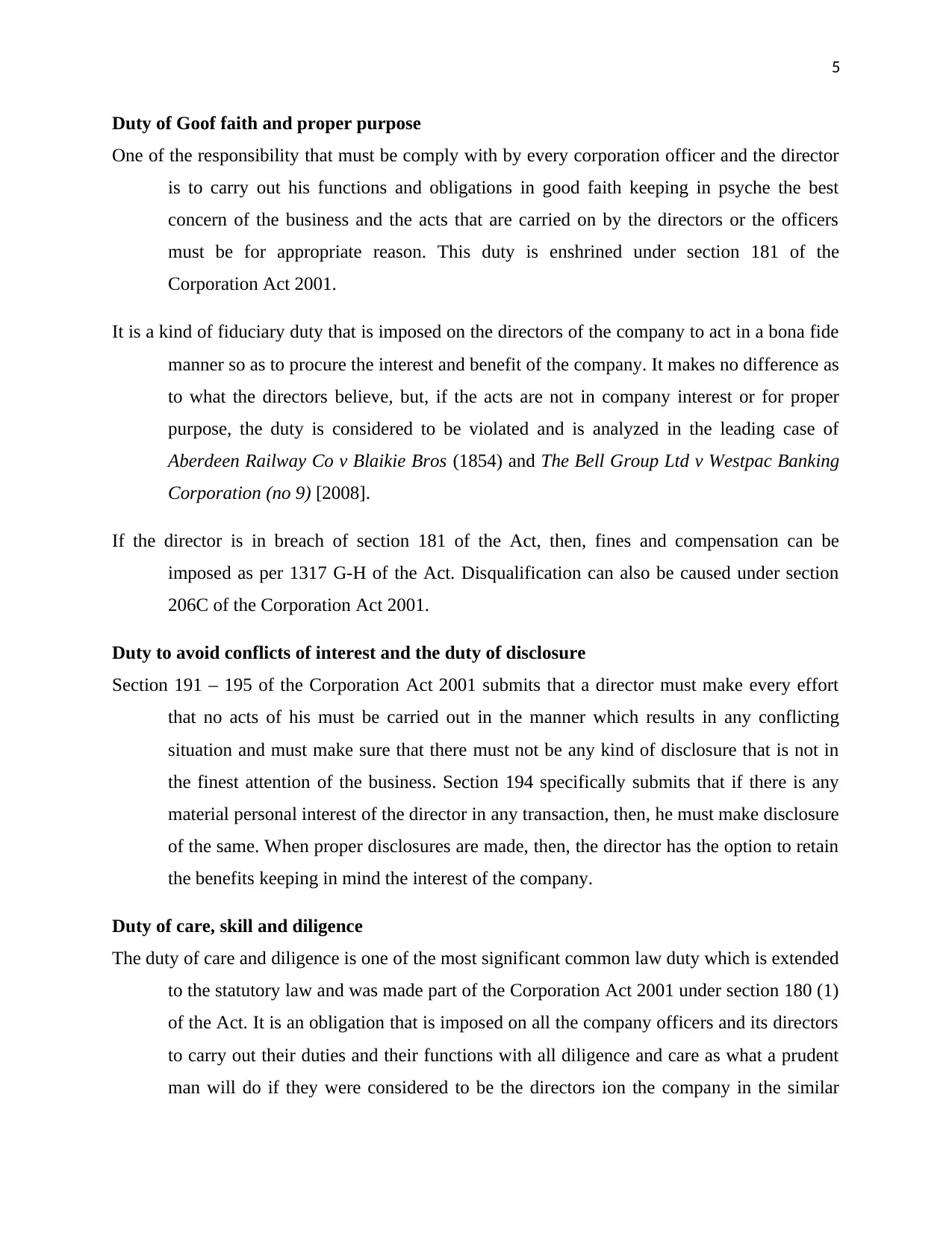
5
Duty of Goof faith and proper purpose
One of the responsibility that must be comply with by every corporation officer and the director
is to carry out his functions and obligations in good faith keeping in psyche the best
concern of the business and the acts that are carried on by the directors or the officers
must be for appropriate reason. This duty is enshrined under section 181 of the
Corporation Act 2001.
It is a kind of fiduciary duty that is imposed on the directors of the company to act in a bona fide
manner so as to procure the interest and benefit of the company. It makes no difference as
to what the directors believe, but, if the acts are not in company interest or for proper
purpose, the duty is considered to be violated and is analyzed in the leading case of
Aberdeen Railway Co v Blaikie Bros (1854) and The Bell Group Ltd v Westpac Banking
Corporation (no 9) [2008].
If the director is in breach of section 181 of the Act, then, fines and compensation can be
imposed as per 1317 G-H of the Act. Disqualification can also be caused under section
206C of the Corporation Act 2001.
Duty to avoid conflicts of interest and the duty of disclosure
Section 191 – 195 of the Corporation Act 2001 submits that a director must make every effort
that no acts of his must be carried out in the manner which results in any conflicting
situation and must make sure that there must not be any kind of disclosure that is not in
the finest attention of the business. Section 194 specifically submits that if there is any
material personal interest of the director in any transaction, then, he must make disclosure
of the same. When proper disclosures are made, then, the director has the option to retain
the benefits keeping in mind the interest of the company.
Duty of care, skill and diligence
The duty of care and diligence is one of the most significant common law duty which is extended
to the statutory law and was made part of the Corporation Act 2001 under section 180 (1)
of the Act. It is an obligation that is imposed on all the company officers and its directors
to carry out their duties and their functions with all diligence and care as what a prudent
man will do if they were considered to be the directors ion the company in the similar
Duty of Goof faith and proper purpose
One of the responsibility that must be comply with by every corporation officer and the director
is to carry out his functions and obligations in good faith keeping in psyche the best
concern of the business and the acts that are carried on by the directors or the officers
must be for appropriate reason. This duty is enshrined under section 181 of the
Corporation Act 2001.
It is a kind of fiduciary duty that is imposed on the directors of the company to act in a bona fide
manner so as to procure the interest and benefit of the company. It makes no difference as
to what the directors believe, but, if the acts are not in company interest or for proper
purpose, the duty is considered to be violated and is analyzed in the leading case of
Aberdeen Railway Co v Blaikie Bros (1854) and The Bell Group Ltd v Westpac Banking
Corporation (no 9) [2008].
If the director is in breach of section 181 of the Act, then, fines and compensation can be
imposed as per 1317 G-H of the Act. Disqualification can also be caused under section
206C of the Corporation Act 2001.
Duty to avoid conflicts of interest and the duty of disclosure
Section 191 – 195 of the Corporation Act 2001 submits that a director must make every effort
that no acts of his must be carried out in the manner which results in any conflicting
situation and must make sure that there must not be any kind of disclosure that is not in
the finest attention of the business. Section 194 specifically submits that if there is any
material personal interest of the director in any transaction, then, he must make disclosure
of the same. When proper disclosures are made, then, the director has the option to retain
the benefits keeping in mind the interest of the company.
Duty of care, skill and diligence
The duty of care and diligence is one of the most significant common law duty which is extended
to the statutory law and was made part of the Corporation Act 2001 under section 180 (1)
of the Act. It is an obligation that is imposed on all the company officers and its directors
to carry out their duties and their functions with all diligence and care as what a prudent
man will do if they were considered to be the directors ion the company in the similar
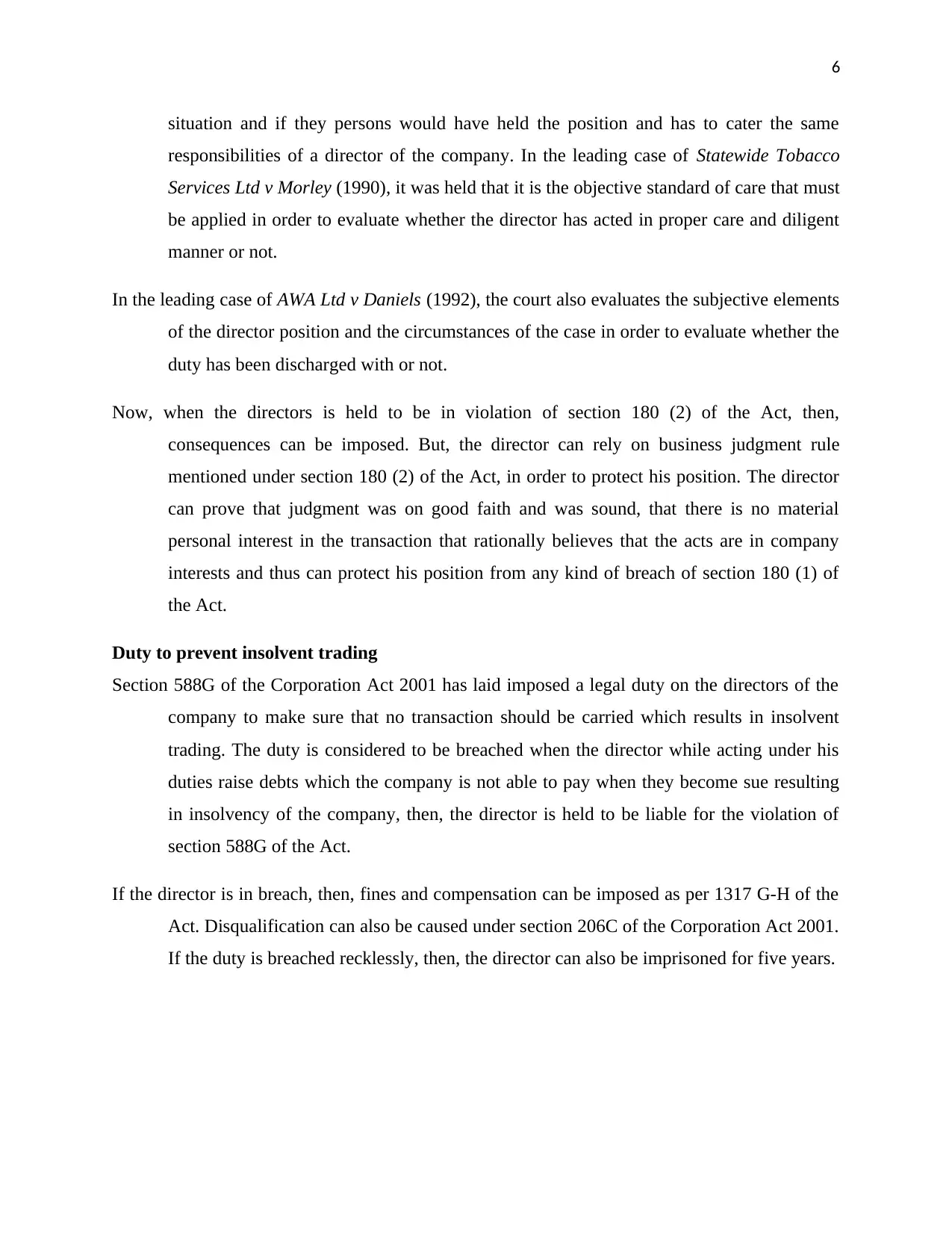
6
situation and if they persons would have held the position and has to cater the same
responsibilities of a director of the company. In the leading case of Statewide Tobacco
Services Ltd v Morley (1990), it was held that it is the objective standard of care that must
be applied in order to evaluate whether the director has acted in proper care and diligent
manner or not.
In the leading case of AWA Ltd v Daniels (1992), the court also evaluates the subjective elements
of the director position and the circumstances of the case in order to evaluate whether the
duty has been discharged with or not.
Now, when the directors is held to be in violation of section 180 (2) of the Act, then,
consequences can be imposed. But, the director can rely on business judgment rule
mentioned under section 180 (2) of the Act, in order to protect his position. The director
can prove that judgment was on good faith and was sound, that there is no material
personal interest in the transaction that rationally believes that the acts are in company
interests and thus can protect his position from any kind of breach of section 180 (1) of
the Act.
Duty to prevent insolvent trading
Section 588G of the Corporation Act 2001 has laid imposed a legal duty on the directors of the
company to make sure that no transaction should be carried which results in insolvent
trading. The duty is considered to be breached when the director while acting under his
duties raise debts which the company is not able to pay when they become sue resulting
in insolvency of the company, then, the director is held to be liable for the violation of
section 588G of the Act.
If the director is in breach, then, fines and compensation can be imposed as per 1317 G-H of the
Act. Disqualification can also be caused under section 206C of the Corporation Act 2001.
If the duty is breached recklessly, then, the director can also be imprisoned for five years.
situation and if they persons would have held the position and has to cater the same
responsibilities of a director of the company. In the leading case of Statewide Tobacco
Services Ltd v Morley (1990), it was held that it is the objective standard of care that must
be applied in order to evaluate whether the director has acted in proper care and diligent
manner or not.
In the leading case of AWA Ltd v Daniels (1992), the court also evaluates the subjective elements
of the director position and the circumstances of the case in order to evaluate whether the
duty has been discharged with or not.
Now, when the directors is held to be in violation of section 180 (2) of the Act, then,
consequences can be imposed. But, the director can rely on business judgment rule
mentioned under section 180 (2) of the Act, in order to protect his position. The director
can prove that judgment was on good faith and was sound, that there is no material
personal interest in the transaction that rationally believes that the acts are in company
interests and thus can protect his position from any kind of breach of section 180 (1) of
the Act.
Duty to prevent insolvent trading
Section 588G of the Corporation Act 2001 has laid imposed a legal duty on the directors of the
company to make sure that no transaction should be carried which results in insolvent
trading. The duty is considered to be breached when the director while acting under his
duties raise debts which the company is not able to pay when they become sue resulting
in insolvency of the company, then, the director is held to be liable for the violation of
section 588G of the Act.
If the director is in breach, then, fines and compensation can be imposed as per 1317 G-H of the
Act. Disqualification can also be caused under section 206C of the Corporation Act 2001.
If the duty is breached recklessly, then, the director can also be imprisoned for five years.
⊘ This is a preview!⊘
Do you want full access?
Subscribe today to unlock all pages.

Trusted by 1+ million students worldwide
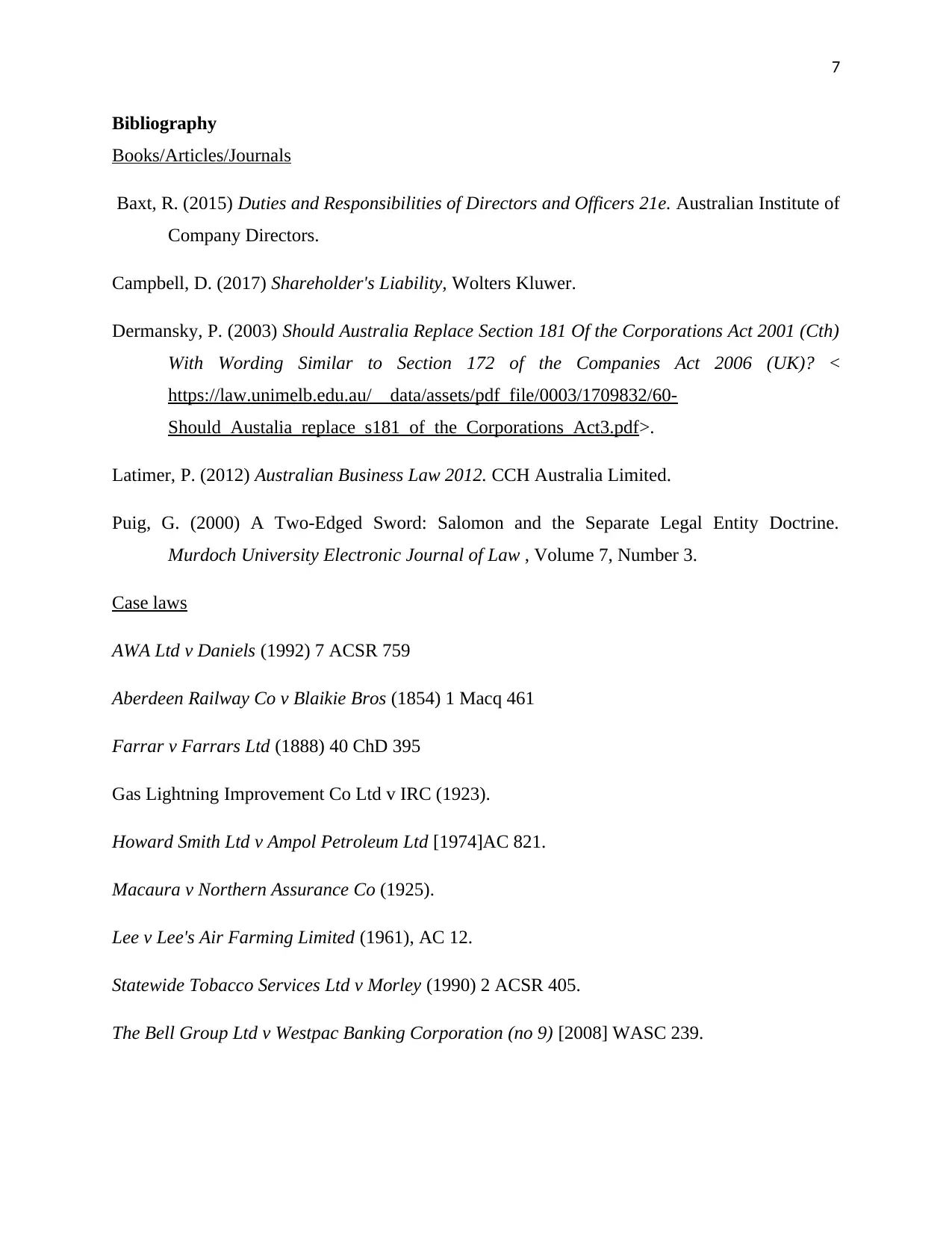
7
Bibliography
Books/Articles/Journals
Baxt, R. (2015) Duties and Responsibilities of Directors and Officers 21e. Australian Institute of
Company Directors.
Campbell, D. (2017) Shareholder's Liability, Wolters Kluwer.
Dermansky, P. (2003) Should Australia Replace Section 181 Of the Corporations Act 2001 (Cth)
With Wording Similar to Section 172 of the Companies Act 2006 (UK)? <
https://law.unimelb.edu.au/__data/assets/pdf_file/0003/1709832/60-
Should_Austalia_replace_s181_of_the_Corporations_Act3.pdf>.
Latimer, P. (2012) Australian Business Law 2012. CCH Australia Limited.
Puig, G. (2000) A Two-Edged Sword: Salomon and the Separate Legal Entity Doctrine.
Murdoch University Electronic Journal of Law , Volume 7, Number 3.
Case laws
AWA Ltd v Daniels (1992) 7 ACSR 759
Aberdeen Railway Co v Blaikie Bros (1854) 1 Macq 461
Farrar v Farrars Ltd (1888) 40 ChD 395
Gas Lightning Improvement Co Ltd v IRC (1923).
Howard Smith Ltd v Ampol Petroleum Ltd [1974]AC 821.
Macaura v Northern Assurance Co (1925).
Lee v Lee's Air Farming Limited (1961), AC 12.
Statewide Tobacco Services Ltd v Morley (1990) 2 ACSR 405.
The Bell Group Ltd v Westpac Banking Corporation (no 9) [2008] WASC 239.
Bibliography
Books/Articles/Journals
Baxt, R. (2015) Duties and Responsibilities of Directors and Officers 21e. Australian Institute of
Company Directors.
Campbell, D. (2017) Shareholder's Liability, Wolters Kluwer.
Dermansky, P. (2003) Should Australia Replace Section 181 Of the Corporations Act 2001 (Cth)
With Wording Similar to Section 172 of the Companies Act 2006 (UK)? <
https://law.unimelb.edu.au/__data/assets/pdf_file/0003/1709832/60-
Should_Austalia_replace_s181_of_the_Corporations_Act3.pdf>.
Latimer, P. (2012) Australian Business Law 2012. CCH Australia Limited.
Puig, G. (2000) A Two-Edged Sword: Salomon and the Separate Legal Entity Doctrine.
Murdoch University Electronic Journal of Law , Volume 7, Number 3.
Case laws
AWA Ltd v Daniels (1992) 7 ACSR 759
Aberdeen Railway Co v Blaikie Bros (1854) 1 Macq 461
Farrar v Farrars Ltd (1888) 40 ChD 395
Gas Lightning Improvement Co Ltd v IRC (1923).
Howard Smith Ltd v Ampol Petroleum Ltd [1974]AC 821.
Macaura v Northern Assurance Co (1925).
Lee v Lee's Air Farming Limited (1961), AC 12.
Statewide Tobacco Services Ltd v Morley (1990) 2 ACSR 405.
The Bell Group Ltd v Westpac Banking Corporation (no 9) [2008] WASC 239.
Paraphrase This Document
Need a fresh take? Get an instant paraphrase of this document with our AI Paraphraser

8
1 out of 8
Related Documents
Your All-in-One AI-Powered Toolkit for Academic Success.
+13062052269
info@desklib.com
Available 24*7 on WhatsApp / Email
![[object Object]](/_next/static/media/star-bottom.7253800d.svg)
Unlock your academic potential
Copyright © 2020–2026 A2Z Services. All Rights Reserved. Developed and managed by ZUCOL.





